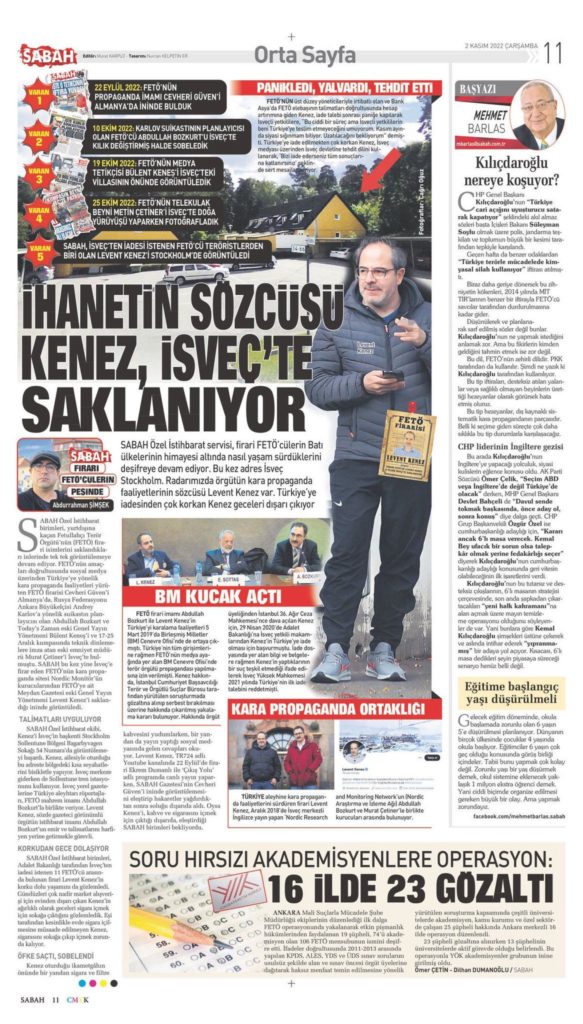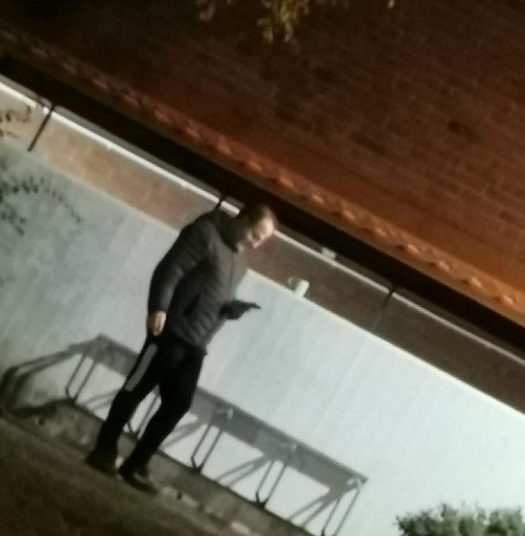Nordic Monitor/Stockholm
Levent Kenez, the Swedish-based editor of Nordic Monitor, was the latest Turkish journalist spied on by Turkey’s intelligence agency, which leaked his private information to the media back home. A newspaper run by Turkish President Recep Tayyip Erdoğan’s family published photos of Kenez on Tuesday in front of his apartment in Stockholm, where he lives with his family, and disclosed his address and details of his daily routine.
Calling Kenez “the spokesperson of the betrayal,” the pro-government Sabah daily claimed that he is hiding in Sweden. The paper also alleged that Kenez, who was among the founders of the Stockholm Center for Freedom and Nordic Monitor, is involved in activities against Turkey. Publishing a photo of a panel discussion that Kenez attended at the United Nations Office in Geneva, Sabah stated that despite all of Ankara’s efforts, the event could not be canceled.

It’s no surprise that pro-government media outlets quoted Sabah’s story verbatim. Kenez was also targeted by Hürriyet, another pro-government daily, which published his photo on its front page with a story titled “Terrorists requested from Sweden” on June 27.
By revealing Kenez’s address and spying on his daily routine, Turkish intelligence agents and its operatives at Sabah broke several Swedish laws. Kenez told Nordic Monitor that he would file a complaint against the people who were involved in disclosing his confidential information and asked Swedish authorities to investigate Serhat Albayrak, the owner of Sabah, and his employees Abdurrahman Şimşek and Çağri Oğuz for violating Swedish laws on refugee spying and revealing a protected address as well as those Turkish intelligence operatives and assets who aided and abetted them during surveillance and intelligence gathering activities on Swedish soil.

Sabah previously published similar stories provided by Turkish Intelligence about three persons who are living in Stockholm: Abdullah Bozkurt, editor-in-chief of Nordic Monitor; Bülent Keneş, former editor-in-chief of Today’s Zaman, which was shut down by the Erdoğan government; and purged police chief and former security advisor of Nordic Monitor Murat Çetiner. Investigative journalist Cevheri Güven, who resides in Germany, was also recently targeted by Sabah.
Kenez, on a YouTube program hosted by the Belgian-based TR724 news website, said on Thursday that he was targeted by the Turkish government because of his journalism activities. Kenez stated that it was very clear why his address and routine were exposed, adding that although there are numerous television stations, newspapers and websites under the government’s control, the facts cannot be overshadowed by propaganda.
Meanwhile, head of the Swedish Journalists Union Ulrika Hyllert called in the Swedish government to protect Turkish journalists in an article for the Swedish Expressen daily on October 31.
“By using Sweden’s NATO membership as a hostage, President Erdoğan now wants to stifle the critical voices that are still heard from Sweden. Here, the Swedish government must clearly take a position in favor of freedom of expression.
“The journalists who are being hunted by Erdoğan in Sweden must be protected by the Swedish authorities. Sweden must stop pretending that the demands that Turkey puts forward in the negotiations rest on democratic foundations.
“We demand that the government in the talks with Turkey stand up for the protection of human rights in a way that befits a democracy like Sweden,” she wrote.
The regime of Erdoğan is hunting down exiled turkish journalists in Sweden. They must be protected by Swedish authorities. Turkey cannot be allowed to hold the Nato membership hostage any longer. @IFJGlobal @EFJEUROPE https://t.co/CAhyqTP3CI
— Journalistförbundet (@journalistforb) October 31, 2022
The Swedish Supreme Court last year rejected a request from Turkey for the extradition of Kenez, ruling that Turkey’s allegations against Kenez did not contain the element of a crime under Swedish law. The high court also stated that if Kenez returned to Turkey, he would face the risk of persecution.
The Supreme Court ruled that Kenez’s journalistic activity as editor-in-chief of the Meydan daily would not correspond to a crime under Swedish law, contrary to Turkey’s allegations, even if his newspaper were to have had links to a particular designated organization, referring to the Gülen movement, a group critical of Erdoğan.
The high court also pointed out that an extradition cannot take place because of descent, belonging to a certain social group or religious or political opinions and added that the risk of persecution in the foreign state is another obstacle to approving extradition requests.
The court also referred to Kenez’s political refugee status, which was granted due to the risk of persecution.
Kenez was the former editor-in-chief of the Meydan daily, which was unlawfully shut down by the Turkish government in 2016. He was briefly detained during a police raid on its headquarters in İstanbul following a controversial coup attempt in 2016. A new arrest warrant was issued the day after his release. Kenez had to flee Turkey by crossing the Evros River to Greece to avoid the risk of persecution and arbitrary arrest. He has since then been living in exile in Sweden.












